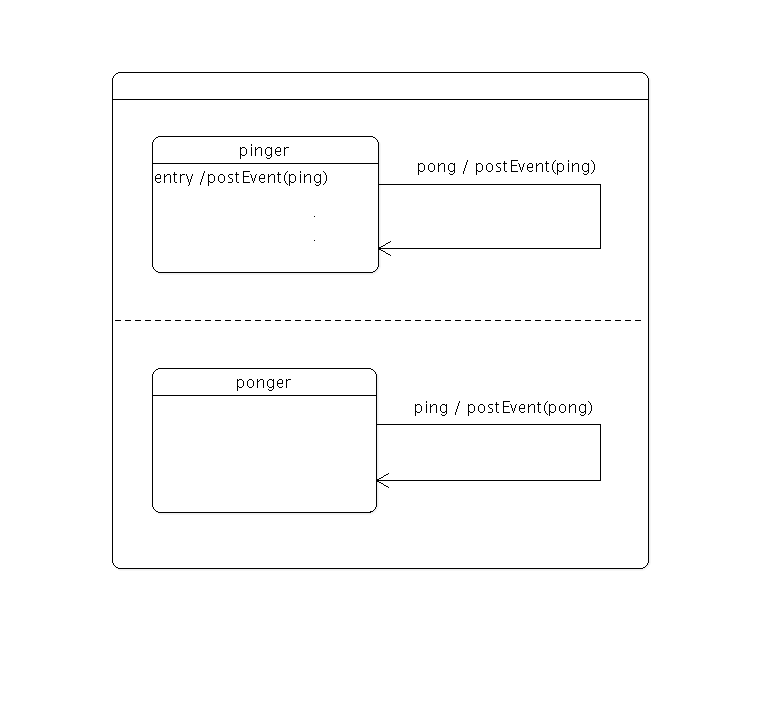This example implements a statechart where two states communicate by posting events to the state machine. The state chart looks as follows:

The
pinger
and
ponger
states are parallel states, i.e. they are entered simultaneously and will take transitions independently of eachother.
The
pinger
state will post the first
ping
event upon entry; the
ponger
state will respond by posting a
pong
event; this will cause the
pinger
state to post a new
ping
event; and so on.
class PingEvent : public QEvent { public: PingEvent() : QEvent(QEvent::Type(QEvent::User+2)) {} }; class PongEvent : public QEvent { public: PongEvent() : QEvent(QEvent::Type(QEvent::User+3)) {} };
Two custom events are defined,
PingEvent
and
PongEvent
.
class Pinger : public QState { public: Pinger(QState *parent) : QState(parent) {} protected: void onEntry(QEvent *) override { machine()->postEvent(new PingEvent()); fprintf(stdout, "ping?\n"); } };
The
Pinger
class defines a state that posts a
PingEvent
to the state machine when the state is entered.
class PingTransition : public QAbstractTransition { public: PingTransition() {} protected: bool eventTest(QEvent *e) override { return (e->type() == QEvent::User+2); } void onTransition(QEvent *) override { machine()->postDelayedEvent(new PongEvent(), 500); fprintf(stdout, "pong!\n"); } };
The
PingTransition
class defines a transition that is triggered by events of type
PingEvent
, and that posts a
PongEvent
(with a delay of 500 milliseconds) to the state machine when the transition is triggered.
class PongTransition : public QAbstractTransition { public: PongTransition() {} protected: bool eventTest(QEvent *e) override { return (e->type() == QEvent::User+3); } void onTransition(QEvent *) override { machine()->postDelayedEvent(new PingEvent(), 500); fprintf(stdout, "ping?\n"); } };
The
PongTransition
class defines a transition that is triggered by events of type
PongEvent
, and that posts a
PingEvent
(with a delay of 500 milliseconds) to the state machine when the transition is triggered.
int main(int argc, char **argv) { QCoreApplication app(argc, argv); QStateMachine machine; QState *group = new QState(QState::ParallelStates); group->setObjectName("group");
The main() function begins by creating a state machine and a parallel state group.
Pinger *pinger = new Pinger(group);
pinger->setObjectName("pinger");
pinger->addTransition(new PongTransition());
QState *ponger = new QState(group);
ponger->setObjectName("ponger");
ponger->addTransition(new PingTransition());
Next, the
pinger
and
ponger
states are created, with the parallel state group as their parent state. Note that the transitions are
targetless
. When such a transition is triggered, the source state won't be exited and re-entered; only the transition's onTransition() function will be called, and the state machine's configuration will remain the same, which is precisely what we want in this case.
machine.addState(group);
machine.setInitialState(group);
machine.start();
return app.exec();
}
Finally, the group is added to the state machine, the machine is started, and the application event loop is entered.
文件: